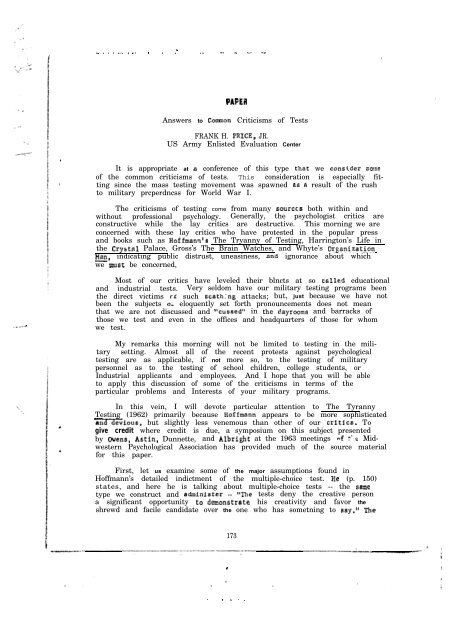Technical Report - International Military Testing Association
Technical Report - International Military Testing Association
Technical Report - International Military Testing Association
You also want an ePaper? Increase the reach of your titles
YUMPU automatically turns print PDFs into web optimized ePapers that Google loves.
._“...-<br />
.<br />
,<br />
._ I . . ..,_ . _, _ . . .-<br />
.<br />
__ .I ^., bL<br />
PAPEA<br />
Answers to Common Criticisms of Tests<br />
FRANK H. PR-ICE, JR.<br />
US Army Enlisted Evaluation Center<br />
It is appropriate at s conference of this type that we constder sane<br />
of the common criticisms of tests. This consideration is especially fitting<br />
since the mass testing movement was spawned as a result of the rush<br />
to military prcperdncss for World War I.<br />
The criticisms of testing come from many sources both within and<br />
without professional psychology. Generally, the psychologist critics are<br />
constructive while the lay critics are destructive. This morning we are<br />
concerned with these lay critics who have protested in the popular press<br />
and books such as Hoffmann’s The Tryanny of <strong>Testing</strong>, Harrington’s Life in<br />
the Crystnl Palace, Gross’s The Brain Watches, and Whyte’s Crgnnfzation<br />
&, indicating public distrust, uneasiness, and ignorance about which<br />
we mus’t be concerned,<br />
Most of our critics have leveled their blncts at so c6lled educational<br />
and industrial tests. Very seldom have our military testing programs been<br />
the direct victims cr’ such scath:ng attacks; but, just because we have not<br />
been the subjects a; eloquently set forth pronouncements does not mean<br />
that we are not discussed and “cussed” in the dayrooms and barracks of<br />
those we test and even in the offices and headquarters of those for whom<br />
we test.<br />
My remarks this morning will not be limited to testing in the military<br />
setting. Almost all of the recent protests against psychological<br />
testing are as applicable, if not more so, to the testing of military<br />
personnel as to the testing of school children, college students, or<br />
Industrial applicants and employees. And I hope that you will be able<br />
to apply this discussion of some of the criticisms in terms of the<br />
particular problems and Interests of your military programs.<br />
In this vein, I will devote particular attention to The Tyranny<br />
<strong>Testing</strong> (1962) primarily because Hoffmann appears to be more sophisticated<br />
atld-devious, but slightly less venemous than other of our critfcs. To<br />
give credit where credit is due, a symposium on this subject presented<br />
by Owens, Astin, Dunnette, and Albright at the 1963 meetings 4 t’,e Midwestern<br />
Psychological <strong>Association</strong> has provided much of the source material<br />
for this paper.<br />
First, let us examine some of the major assumptions found in<br />
Hoffmann’s detailed indictment of the multiple-choice test. He (p. 150)<br />
states, and here he is talking about multiple-choice tests -- the same<br />
type we construct and admfnfster -- “The tests deny the creative person<br />
a significant opportunity to.demonstrate his creativity and favor the<br />
shrewd and facile candidate over the one who has sometning to say.” The<br />
173<br />
, I<br />
_ . _ . _









